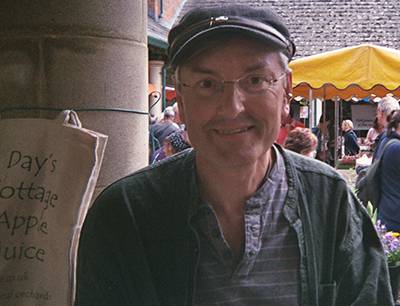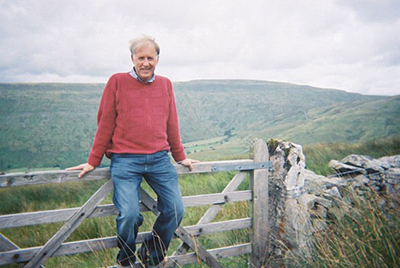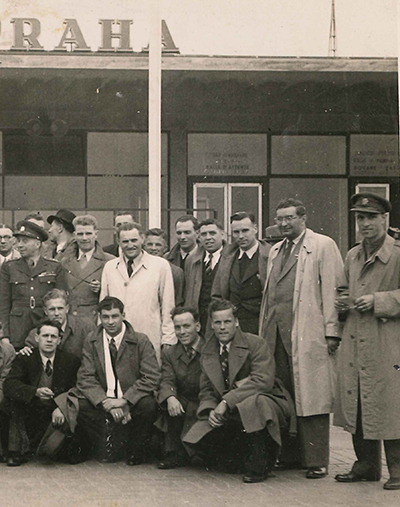Our Fathers’ Wartime Careers
31/05/2018 - 5.45
Dave Kašpar and Andrew Ward


When we met for the first time, at a Christmas party in 2015, we were astonished to discover that our fathers, both international footballers, had known each other in Czechoslovakia in May 1946.
Miloslav (‘Mila’) Kašpar, a Czech international, was part of the reception party when FA Cup-winners Derby County toured Czechoslovakia in 1946. Tim Ward, later an England international, was with the Derby County squad.
We identified our fathers from a photograph taken at Prague airport in May 1946. Tim Ward had kept the picture in a scrapbook. In a group of nearly forty people, our fathers were next but one to each other. Mila Kašpar was dressed in Czech Army uniform and Tim Ward was in casual clothes.
 Mila Kašpar’s war had begun in March 1939 when he was part of a regiment in the Slovak capital of Bratislava. His spell in Soviet prisoner-of-war camps ended when Russian–German relations deteriorated. After he was released he reached the front line in France by way of Turkey and Syria. Meanwhile the Wehrmacht had marched into the Czech provinces of Bohemia and Moravia and declared them a German protectorate. Kašpar was smuggled into Prague, writing on wet paper so that his messages became invisible. He fought in France at Coulommiers on the River Marne and was awarded the Croix de Guerre for organising his men to carry munitions and gun parts across a badly bombed bridge over the River Loire. The Czechs retreated to Sète, a small town on France’s Mediterranean coast, and through the Straits of Gibraltar. When Kašpar saw the British Navy, he thought for the first time that they could win the war. In August 1940 he crossed the English Channel to Plymouth in England.
Mila Kašpar’s war had begun in March 1939 when he was part of a regiment in the Slovak capital of Bratislava. His spell in Soviet prisoner-of-war camps ended when Russian–German relations deteriorated. After he was released he reached the front line in France by way of Turkey and Syria. Meanwhile the Wehrmacht had marched into the Czech provinces of Bohemia and Moravia and declared them a German protectorate. Kašpar was smuggled into Prague, writing on wet paper so that his messages became invisible. He fought in France at Coulommiers on the River Marne and was awarded the Croix de Guerre for organising his men to carry munitions and gun parts across a badly bombed bridge over the River Loire. The Czechs retreated to Sète, a small town on France’s Mediterranean coast, and through the Straits of Gibraltar. When Kašpar saw the British Navy, he thought for the first time that they could win the war. In August 1940 he crossed the English Channel to Plymouth in England.
Tim Ward started his football career with Cheltenham Town before joining Derby County in January 1937. He is the only professional Cheltenham Town player to have gone on to play for England. In September 1939, when World War Two was declared in Britain, Ward was a 21-year-old professional footballer with Derby County. He was posted to Scotland, where he underwent army training near Glasgow and played for Hamilton Academicals. He was soon playing in representative matches, the only Englishman in Scottish Army teams. Then he was posted to Caithness, in northern Scotland, where he and his colleagues trained in difficult terrain and practised boat trips to the Orkneys, thereby preparing for the later D-Day Normandy landings. For four years, from 1941 to 1945, Tim Ward had little opportunity to play high-level football.
Mila Kašpar played football in England during World War Two. His matches included the Allied Armies versus the British Army at Stamford Bridge in March 1941, in front of a crowd of over 10,000. The Times said that Kašpar was the best player in the Allied Armies team. During the period from February 1941 to March 1943 he captained a Czech Army football team that played more than a dozen matches in England. Winning and losing was not the real aim. Such games provided a chance to make friends, collaborate, exchange news and seal alliances with other European nations. The matches in England also included teams from friendly nations, such as Holland, Belgium, Poland, Norway, Canada and USA. In September 1941, the Czech Army team was unfortunate to lose 3-2 against Birmingham (soon to be called Birmingham City). In the programme for the match Mila Kašpar was described as ‘a much-experienced soldier for a young man’.
In an article in Picture Post, published in March 1941, Charles Buchan, a former international footballer, declared that the recent ‘Allied Armies v British Army’ match at Stamford Bridge would go down in history as one of the most astonishing ever played. Said Buchan: ‘Its significance rested in the fact that during the greatest war of all times and in the midst of visits from enemy bombers dealing death and destruction, it was possible to gather together a team of sportsmen from the conquered countries in Europe, good enough to match their skill against the best England could produce.’ When the Allied Armies played the British Army millions of people around the world heard a BBC radio broadcast of the match in different languages.
During 1944 and 1945 Tim Ward was attached to the 15th Scottish Division as a nursing orderly, and he treated casualties in the front line. His division worked their way through Normandy, across the River Seine, and into Belgium and Holland. Ward stowed away a football in a vehicle and when they were certain of an hour’s leisure they would play ‘Scotland versus England’ on a patch of waste ground. Then, eventually, they reached northern Germany. Forty years later, in 1985, Tim Ward gave his son a slip of paper which explained a lot in a few words. ‘During the campaign it was only natural that we should resent the fact that we had to give up so much at such an important time in our lives,’ wrote Tim Ward. ‘Wherever we were, when a writing home session was in progress, someone would say “Dear Mother, is it worth it.” A few days before the Germans capitulated we went into Belsen Concentration Camp. That was the most horrific sight possible; for ages afterwards, I had nightmares and never again did we ask the question, “was it worth it?” We knew, without a doubt.’
When Mila Kašpar first moved to Britain he spoke little English but he went on to learn seven languages. He became an interpreter and instructor to the London Scottish Regiment and the South Staffordshire Regiment. He collected useful information when he played football in Britain, and he helped to choose a team to assassinate the German governor Reinhard Heydich in Prague in 1942. Around this time Mila Kašpar met Paulette Pegg, the daughter of a Ministry of Health inspector, whom he married in 1944. Paulette soon learnt excellent Czech, and Mila learnt excellent English. In 1944 Mila volunteered to return to the Eastern Front.
Tim Ward was demobbed towards the end of April 1946, too late to be a contender for Derby County’s FA Cup Final winning team at Wembley. It was soon after that Final that the Derby team toured Czechoslovakia. On the whole, Tim Ward didn't know what to make of the tour to Czechoslovakia. He had the tickets and necessary papers to travel to Switzerland and play for the British Army of the Rhine (BAOR) against the Swiss national team but he went to Czechoslovakia with Derby County instead. He’d spent most of the last year playing football for the BAOR team. Based in transit camps at Münster and Wuppertal in Germany, the BAOR players had made some harrowing journeys around Europe to play representative matches in Belgium, Poland, Italy, Austria and various stadia in Germany. Top British teams were flown out to entertain the troops with matches against BAOR. They were the Vera Lynns of the football world. After the matches the Germans were allowed in the stadia to pick up cigarette ends.
Our two fathers would certainly have talked to each other when they met in Prague in May 1946. Mila Kašpar was involved in the football negotiations – he worked with the Czech national team – and his English was so good by then that he could interpret for visiting Derby County players. That May the Derby Evening Telegraph commented about Nazi war criminals being hanged in Prague’s public square: ‘The Derby County players were among the 5,000 people who yesterday saw the public hanging of Karl Hermann Frank, “the Butcher of Lidice”.’
Tim Ward missed Derby County’s FA Cup Final success in April 1946 but he was back in the team two days later for a wartime League match at Southampton. He was just glad to be alive. He played for Derby County until March 1951 and won international caps against Belgium (September 1947) and Wales (November 1948). He later spent fifteen years as a football-club manager, working at Exeter City (1953), Barnsley (1953 to 1960), Grimsby Town (1960 to 1962), Derby County (1962 to 1967) and Carlisle United (1967 to 1968). He signed 18-year-old Graham Taylor for Grimsby Town and was Brian Clough’s predecessor at Derby County. He continued to play with the Derby County’s ex-Rams team until his early seventies. He died in January 1993 at the age of seventy-five.
In 1948 Mila Kašpar moved from Czechoslovakia to Britain and accepted a role in military intelligence. He worked for Deuxieme Bureau in Paris and Innsbruck, and later ran agents behind the Iron Curtain. Then he moved to MI5 in Cyprus before going to Beirut, where he called himself Miles Kingdon of Skyway Airways. He died in November 2009 at the age of ninety-five and was survived by his wife and three sons.
The British Pathé News site on YouTube has some action pictures featuring Mila Kašpar and Tim Ward, including very brief footage of Kašpar leading out his Allied Armies team (white shirts) to play against the British Army at Stamford Bridge in 1941. A match report in The Times included these words: ‘Kašpar, at left full-back, frequently got the better of his struggles with Griffiths.’ The British Pathé News site also shows footage of Tim Ward (Derby County) taking a throw-in during the 1-1 draw at Queen’s Park Rangers in 1948.
Biographies
Dave Kašpar
Dave Kašpar and Helen Brent-Smith run a family business making and selling organic apple juices and ciders from traditional Gloucestershire orchards.
Andrew Ward
Andrew Ward is the author of numerous books, including Armed with a Football (Crowberry, 1994), a memoir about family, football and war.


/prod01/wlvacuk/media/departments/digital-content-and-communications/images-2024/240624-Alumni-Awards-2024-Resized.jpg)
/prod01/wlvacuk/media/departments/digital-content-and-communications/images-18-19/220325-Engineers_teach_thumbail.jpg)
/prod01/wlvacuk/media/departments/digital-content-and-communications/images-2024/240627-UN-Speaker-Resized.jpg)
/prod01/wlvacuk/media/departments/digital-content-and-communications/images-2024/240320-Uzbekistan-Resized.jpg)
/prod01/wlvacuk/media/departments/digital-content-and-communications/images-2024/240229-The-Link-Resized.jpg)
/prod01/wlvacuk/media/departments/digital-content-and-communications/images-2024/240627-Lady-Aruna-Building-Naming-Resized.jpg)